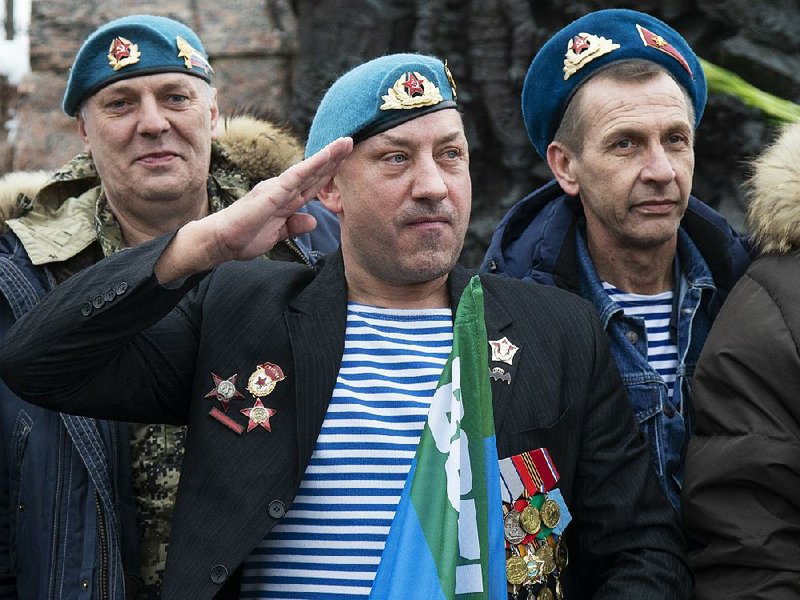MOSCOW -- The Red Army veterans took to the stage and belted out songs from the battlefield: clashes with the enemy and a wartime thirst for Russian vodka. A crowd of Afghan-war elites finger-tapped along to the familiar beat.
The rock concert was something like theme music for the Kremlin's attempt at rewriting history, turning the defeat in Afghanistan into a patriotic victory for Mother Russia.
"Do you, comrade, remember Afghanistan? Glows of fires, Muslim cries?" sang band Cascade, which was composed of camouflage- and medal-wearing veterans, including a percussionist with an Afghan drum and a keyboard player who lost his leg in combat.
It was just one of the ways Russia is marking 30 years since the Soviet military's exit from Afghanistan after a decade of war that strained the Soviet military and left a gaping hole in the country's finances.
The withdrawal in February 1989 also had a deeper sting for the Kremlin.
The Red Army was pushed out of Afghanistan by U.S.-backed mujahedeen fighters, ending a key proxy battle of the Cold War. Two years later, the Soviet Union collapsed.
Pro-democracy movements in Eastern Europe were gaining steam and becoming less fearful of a Soviet-ordered crackdown.
The Kremlin in 1989 called the Afghan war "a political mistake." Russian lawmakers, urged by President Vladimir Putin, are now trying to reverse that declaration with a resolution declaring the war was justified.
History makeovers are not uncommon in many countries. Other uncomfortable truths cannot be glossed over, such as how the anti-Soviet mujahedeen helped create al-Qaida and the Taliban, which have both opposed the West.
But Russia's remake of the Afghan war is among the most comprehensive and systematic.
It is part of Moscow's wider attempt to mold a historical narrative that fits the current ideology under Putin, whose leadership has projected the image of a strong Russia with an unblemished past.
The parliament resolution denounces the 1989 condemnation of the war, saying it was "at odds with the principles of historical justice," and maintains that Moscow sent troops to Afghanistan in December 1979 at the behest of the Kremlin-backed Communist government in Kabul. (In fact, the Soviet invasion forces overthrew that government, assassinated its leader and installed a rival Communist faction completely beholden to Moscow.)
The rehabilitation of the war also comes as Moscow has a renewed influence in Afghanistan. In recent months Russia has played host to two major meetings between the Taliban and Afghan power brokers aimed at finding a way to end the current U.S.-led war.
Today's government in Kabul is unlikely to warm to the idea of Moscow's defense of the war, especially given its recent rebuke of President Donald Trump's revisionist praise of the Soviet invasion.
Unlike other initiatives, such as Putin's restoration of the Stalin-era national anthem at the start of his rule or recasting Ivan the Terrible from bloody to heroic, the rehab work on Afghanistan was somewhat of a surprise.
As recently as November, the country's Channel 1 TV station, a state-run heavyweight, has been airing the fictional series Stormy Weather, depicting war veterans as the dregs of society in the chaotic 1990s. The show received rave reviews.
For some of the conflict's veterans, the government's flip-flop only adds to long-held feelings of despair.
"Such a resolution is really awful," said Valery Shiryaev, who was a decorated military translator in Afghanistan and is now deputy director of independent newspaper Novaya Gazeta.
"My friends, who are other veterans, do not think the Afghan war was a good thing. It was a terrible mistake."
Around 15,000 Soviet soldiers were killed, along with at least 1 million Afghans. Initially, the war was kept hidden from public view, and draftees were sometimes unaware of their final destination until they arrived in Afghanistan. Once bodies started returning home, a wave of hysteria gripped young men and their mothers across the country.
The "Afgantsy," as the veterans are known in Russian, returned to find a crumbling Soviet Union unconcerned by the ordeals they had suffered for the supposed benefit of the motherland.
Afgantsy formed tightknit groups across the country. They regularly meet to reminisce and hold concerts, singing deeply moving tunes, lyrics sprinkled with Dari phrases. But that is only for each other.
At the small Museum for the Afghanistan War, tucked away on the outskirts of Moscow, school groups have been visiting with increasing frequency. "Interest in the war is growing, especially with the 30-year anniversary coming up," said the museum's director, Igor Yerin.
An Afghan war veteran himself, Yerin has spent decades collecting the masses of war memorabilia for the museum, where Soviet rockets and rations of canned beef compete for space with the ragged clothing of mujahedeen fighters.
But even for Yerin, the war conjures up conflicting feelings.
"The re-evaluation by the government is not about rehabilitation, but about remembering," he said. "We Russians switch on the soul first, then the brain."
SundayMonday on 02/17/2019

